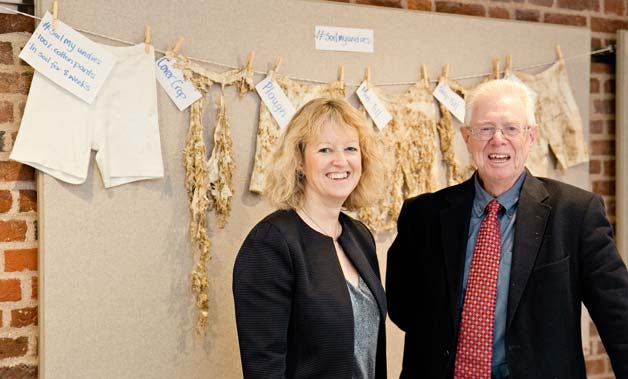
Written by FM Web Editor

Dr Belinda Clarke and Prof Ian Crute
Agri-Tech East and AHDB (the Agriculture and Horticulture Development Board) have announced a joint initiative to accelerate the adoption of innovation in the field. A new position of ‘Knowledge and Innovation Facilitator’ is being created to help deliver a programme of new projects. The announcement was made at Agri-Tech East’s REAP, the flagship conference for the agri-tech sector.
Dr Belinda Clarke, Director of Agri-Tech East, says: “An objective assessment is required of new technology to ensure that it is fit for purpose. Our ambition within Agri-Tech East is to create a number of specific initiatives driven by member interests that can evaluate innovations on-farm, compare findings and then work with researchers and technologists to improve the solutions.
“We need to move beyond focusing on crop yield as the measure of success and look at the bigger picture to make the industry productive, profitable and sustainable. This can be achieved by facilitating well-designed real world projects between our members.
“By working with AHDB we are able to fund a project manager to devise and deliver these projects and also to gain access to the wealth of expertise within AHDB and make this more readily available.”
For AHDB the joint position is part of a wider objective to create closer links with industry. For example, the potato industry is currently under pressure on the use of sprout suppressants essential for long-term storage. AHDB is researching alternative strategies to overcome this at Sutton Bridge Crop Storage Research in Lincolnshire. It is involved with commercial-scale trials, so working closer with partners across the value chain is essential for this.
Professor Ian Crute, AHDB Board Member, spoke at REAP about different models for stimulating and supporting innovation in the industry. He was responding to a presentation about the Argentinian experience by María Beatriz Giraudo, Winner of the Kleckner Prize Global Farming Prize 2016.
Prof Crute commented: “Past experience informs us that a policy environment in agriculture encouraging common purpose, close connectivity and regular interaction between researchers, practitioners and their advisers leads to the emergence of successful innovations that are adopted widely and swiftly. This was certainly the case in the UK in the four decades after the Second World War. However this close alignment between the aims of research institutions and the priorities of agricultural industries no longer seems so evident.
“One reason for this was a down-turn in the value of agricultural products, which led in turn to disinvestment in agriculture-relevant science.”
Giraudo described a similar situation in Argentina and how the farming industry has responded by taking a lead through its investment in agricultural research. A partnership between farmers and academics has enabled the rapid uptake of the latest findings and also directed research at solving industry challenges. This led to successes, such as its approach to no-till cultivation, but also failures, and Giraudo was keen to share her learning points with the UK.
Crute commented that the situation was also changing in the UK. “The food-price spike of 2008 was a ‘wake-up call’ and this prioritised the need for a more active two-way dialogue between researchers and producers and in particular to look harder at the ways that land is used and production prioritised.”
He says: “There is an important distinction to be made between ‘land use’, which is about deciding what the land is used for and ‘land management’, which is how best to manage the land productively and sustainably for its chosen purpose.
“I have argued that the UK could be a very good place to demonstrate in practice the principles of how best to model and devise optimised – sustainable and productive – regional land use and management with global significance. This is because UK agriculture is relatively small scale compared, for example, to Argentina, and there is a high geo-diversity, or soil types, diverse topography, abundant data availability and a high knowledge base.
Dr Crute identifies the need for new metrics for evaluating agricultural output so that the relative value of different land uses – food production, energy generation, and ecosystem services – can be assessed.
He says: “For example, comparing ‘person-years of nutrients’ with ‘joules of energy’ created per hectare per unit of input might be a better way of comparing food production with that of
energy generation.”
These types of cross-disciplinary analyses benefit from the input of thinking from other industries, which is where Agri-Tech East is bringing new approaches.
Dr Clarke continues: “There is no question that really significant innovations are always underpinned by advances in basic scientific understanding, but equally innovation can come from many directions.
“Our members have found that technologists approach problems from a different perspective. A multi-disciplinary approach can provide practical solutions, for example smart irrigation utilises knowledge of plant science alongside better methods of data capture, engineering and resource use.
“With additional resource we will be able to scale up our current programmes such as work with Innovative Farmers where we are coordinating a consortium of six farmers, and introduce new cross-cutting initiatives to accelerate the rate of innovation and its adoption.”
Applications for the role of ‘Knowledge and Innovation Facilitator’ are welcomed.
More details can be found on www.agritech-east.co.uk
The post Moving beyond high yield as measure of success appeared first on Farming Monthly National.
Continue reading more content from Farming Monthly...
If you are enjoying what you read then why not considering subscribing:






